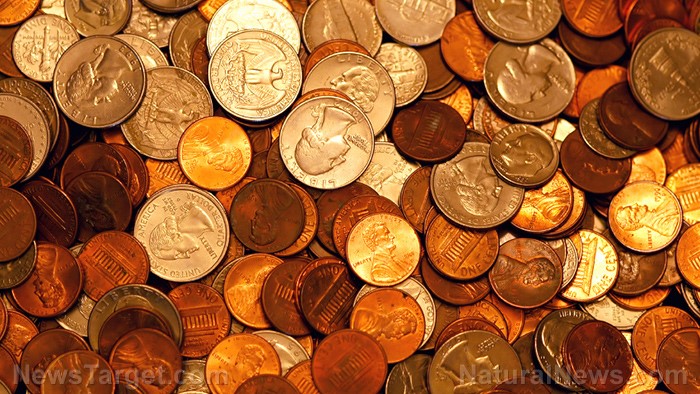
Is the U.S. Treasury trying to END currency by taking change out of circulation?
By Isabelle Z.
Some U.S. retailers have stopped giving customers change because of what is being widely touted as a coin shortage, but many people fear that the Treasury is trying to use coronavirus as an excuse to ramp up the war on cash and end currency in favor of far more trackable electronic transactions.
Kroger recently became the latest retailer to stop returning coins to customers who pay with cash. Notes posted in their grocery stores say that because the Federal Reserve is experiencing a coin shortage, customers can opt to have their change from cash transactions applied to their loyalty cards. They can also round up their purchase to donate the change to charity, or they can use another form of payment altogether.
In late June, the Meijer supermarket chain stopped accepting cash at self-checkout registers due to the coin shortage. This came not long after an announcement by the Federal Reserve that coin rationing would start on June 15, using a temporary coin allocation method based on the historical order volumes and current U.S. Mint production levels.
One bank that normally dispensed up to 500 rolls of pennies per week found its allotment cut to just 100, with similar cuts for other denominations.
A Kroger spokesperson said that the Treasury Department is expecting the shortage to subside as more parts of the country reopen. But not everyone is convinced that the situation is going to improve.
Using the pandemic as an excuse
Since the beginning of the pandemic, we’ve been hearing that the use of paper money is dangerous because the virus may linger on dollar bills and change and be spread to others. On top of that, paying with cash generally requires breaking the social distancing guidelines, whereas contactless cards allow people to maintain a safe distance.
However, the truth is that central banks across the planet have been pushing for the use of digital payments for many years, and the coronavirus crisis gives them the perfect excuse to kick their efforts up a notch.
The idea of a cashless society may be appealing to some in the sense that it’s a lot more convenient in theory, but getting rid of cash means kissing freedom goodbye. A cashless system gives governments and financial institutions the power to track people, monitor them and exert control over them in unprecedented ways.
Going fully digital not only gives them access to your spending habits but also where you are and when, along with valuable insight into your personality, as one study recently showed.
To gain support for the notion of going cashless, they often cite the fact that cash is used by criminals, money launderers and terrorists. That may be true to an extent, but we can’t forget that having paper money in existence also makes it easier for people to go to their bank and withdraw big sums of money, which could create problems during a financial crisis.
Given the signs of the Treasury’s long-standing interest in ending currency, some people are worried that the coin shortage is actually due to them taking advantage of the current state of affairs and intentionally taking change out of circulation rather than any coronavirus-related delays.
Today, it’s a coin shortage. Next it could be dollar bills that are in short supply, and before you know it, we may not have any cash at all, and the government will be tracking every penny we get and every penny we spend. See MoneySupply.news for more articles on currency and money.
Sources for this article include:
From naturalnews.com